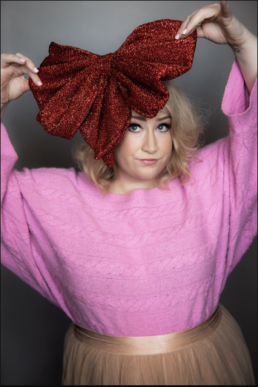These life stories may contain descriptions of childhood trauma and abuse, as well as images, voices and names of people now deceased. If you need help, you can find contact details for some relevant support services on our support page.
Australian writer and comedian, Rosie Waterland (b. 1986), was in foster and kinship care as a child.
Rosie’s mother, Lisa, was born to a sixteen-year-old young mother in 1963 and adopted at birth to an economically well-off North Shore Sydney family. Lisa felt abandoned by her biological family and was later diagnosed with bi-polar disorder. Rosie’s father, Tony, was diagnosed with schizophrenia and used illicit drugs. Both of Rosie’s parents struggled with alcoholism, and their relationship was violent and volatile.
Rosie’s father died when she was eight years old. Her mother was in other relationships, but none lasted long. She was also in and out of rehabilitation, valiantly trying to overcome her addiction to alcohol.
It surprises people when they hear that kids are allowed to live in rehab with their parents…but it does happen…For kids, rehab is a lot like camp. And it never stops your parents from drinking (Waterland, 53).
It wasn’t unusual for Lisa to leave the children alone for a few days. Rosie’s older sister would look after the baby, and Rosie would cook. On one occasion, after the three girls had been on their own for four days, the welfare authorities took charge of them.
We stayed with an uncle for a while. We stayed with our birth grandma for a while. [The baby] was separated from us and lived with some of her dad’s relatives for a while. But nobody seemed to want to keep us (Waterland,105).
Rosie states that she attended more than twenty different schools and lost count of the number of places she lived during her childhood. Finally, there were foster parents willing to take in the three children in their large house on a farm. The foster family included a creepy man who expected the girls to jump in the hot tub without their knickers on.
Twelve months later the girls returned to their mother, who was informed by police “they were investigating claims of sexual abuse made by other girls who had lived with the same foster family.” As far as Waterland knows, the man was never charged and instead was “celebrated on the cover of a newspaper for his charity work” (Waterland, 109-110).
After Rosie’s mum began a relationship with another woman, she contacted the Department of Community Services (DOCS), asking them to collect her “uncontrollable” children. Rosie and her sisters were separated in care.
Tayla and I stayed with our wealthy uncle for a few days, during which time he decided to keep me and not her. I was sent to a fancy boarding school, and Tayla was left to fend for herself in the foster system. She would languish there until, at sixteen, she was old enough to strike out on her own (Waterland,141-142).
Rosie then went on to earn a university degree in her twenties, but struggled with PTSD. She experienced solace in writing, and soon found success writing reviews of the reality show, The Bachelor, for Mamamia, an Australian website for women.
In 2015, Rosie published her first memoir,The Anti Cool Girl, which became an award-winning national bestseller. Rosie’s second book, Every Lie I’ve Ever Told (2017) was also a national bestseller and received critical acclaim. She has written for television and performed live at the Melbourne International Comedy Festival (2016). Her national tour in 2017 was sold out.
Now a highly successful writer and comedian, Rosie describes her journey to self-acceptance.
…I finally realised that after everything I’d been through, the only person I needed to impress was me… being cool is all about compromising who you are. Being anti-cool is about accepting it. Accepting it, owning it, laughing at it and loving it (Waterland).
Rosie has a close relationship with her three sisters, all of whom are committed to breaking the intergenerational cycle of trauma. In 2019, she signed a two-book fiction deal with HarperCollins Australia. Rosie says she is moving on from her past, and now plans “to write about people who aren’t me and who just have fun lives. I just want to laugh every day. That’s all I want.”
References:
Gorman, Vanessa & Waterland, Rosie. “Comedian Rosie Waterland reveals why she’s done mining her painful past for laughs.” Australian Story, 25 Mar 2019. https://www.abc.net.au/news/2019-03-25/rosie-waterland-vows-to-stop-mining-her-painful-past-for-comedy/10879424?utm_campaign=abc_news_web&utm_content=link&utm_medium=content_shared&utm_source=abc_news_web
Rosie Waterland Website. https://rosiewaterland.com/
Waterland, Rosie. The Anti Cool Girl. Sydney: Fourth Estate, 2015.
Image available here.
